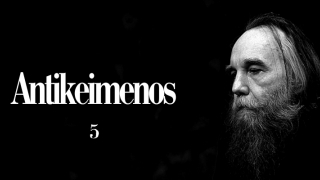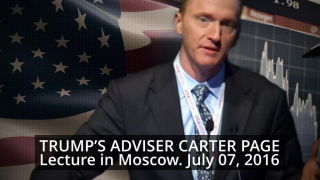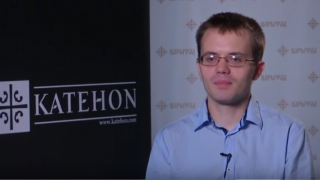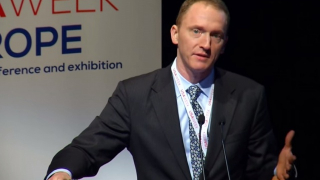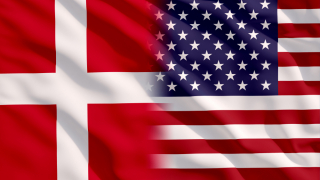Trump, the Unwritten & the Deed
President Donald Trump keeps compromising and embaressing the liberal media not so much because he weaponized digital media like Facebook and Twitter, but because he commands the sublime power of oral communication, almost reaching into transcendence. And by this he gets people to act on behalf of the common good. He has what it takes to actualize the magic triangle of memory, deed and conscience, to which we will return. Taking Donald Trump‘s words literally, as liberal media continue to do, is bound to fail simply because he talks between the lines and is thus able to reach out to the sublime. The sublime is the unique fountain of deeds - which makes all the difference from liberal posturing or between descending elites and ascending populist self awareness. Think about the spoils of Trump‘s recent Indiana rally, summed up by Mark Steyn with Tucker Carlson on Fox News as „subtexts“. According to Steyn, Trump is a prime stage actor who is able to deliver hidden messages to his hilarious crowds - a second message underneath the literal meaning of his speech. Trump simply manages to fully exhaust the potential of what might be called biblical orality - the magic that only the spoken word commands. This will help him in coming elections.
We are talking here about the difficulty of ascending from the visual to the auditive paradigm, i.e. from the written to the spoken word. This ascent is like a „leap of faith“ which has to be managed rhetorically. Few Western leaders master this art today, yet Donald Trump is one of them. The German philosopher Martin Heidegger virtually became a Nazi thinker because he had convinced imself that it is impossible to reach the sublime by simply reversing the natural descent in metaphoric speech from word to image. As a result he took demagogic Nazi propaganda as inevitable and sided with unapologetic “Dasein” and aestehtics rather than sublime religion. He preached that we cannot rise to the sublime by just „inverted thinking“ and reach into the transcendent realm based on written texts alone. Heidegger also pointed in the direction of Immanuel Kant and his failed experiment of ascending to his „categorical Imperative“.
Kant would first split up the ontological human condition, which consists in the polarity between centrifugal „vision“ or image and centripetal „listening“ or word. He essentially rationalized the Lutheran concept of the „two realms“, secularizing it in terms of a divide between the inaccessible thing „in itself“ against the closer to home thing „as such“. As a result Kant denied Judaism the status of religion simply because it consisted of one unified realm instead of two. The Jewish more realistic „netherworld“ is extended only by the „world to come“ - a timebound, non-spatial concept. The Jews in their netherworld celebrate on each Sabbath a glimpse into the promising Messianic times. For them a fixed ontological difference never gained currency.
The two realms is a spatial invention of Protestantism and is attached to centrifugal visualization thus creating a spatial seperation of heaven and hell. Since they internalized this concept by messing up the twin perspectives of our inner and outer self. It is well known that the Reformation aggravated Christian intolerance which resulted in further separatism of Protestants who in their intolerant ways kept splitting into sects. They tend to deny the essential inner dualism of good and evil and developed a habit of projecting their own evil half on the “other”. The same is true for their liberal heirs. One reason for this is that Martin Luther banned the „charitable deed“ which is the only device for holding our inner and outer self together. Ever since the 16th century Protestantism relegated the „liberating deed“ to the stage. It is for this reason that every German village once had its own theatre and today every school has one. Shakespeare was extremely grateful to Luther for this reason and allegedly mentions Wittenberg in one of his plays.
By contrast Roger Scruton, today one of the leading philosophers of the Anglosphere, reminds everyone of the English penchant for the „liberating deed“.1 It made a first appearance as „accountability“ in the Magna Carta. Scruton examplifies this spirit by the huge London demo against the ban on fox hunting almost a decade ago, for him a rehearsal for Brexit. For both are refering to the unwritten “common law” tradition - also a possible source of self restraint which will be deerly needed once Brexit has passed. From the cherishing of liberating deeds stems the famous British habit of keeping the cool in challenging situations - in contrast to the often politically agitated continentals. This has to do with English common sense, whereby tradition and experience rank high in a country also famous for its philosophical „empirism“. Yet all of this speaks to a strong Jewish influence. What could be labeled as an „elective affinity“ is the Jewish and subsequently English fondness of the spoken word and the „unwritten law“, traditionally known as Jewish Oral Law or Mishne Torah and English Common Law respectively.
In this context President Trump’s success seems to be owed to his fidelity to campaign promises regardless of any rhetorical deficiencies. Unlike the run of the mill western leaders of the day Trump is a hardwired realist and draws on facts more than fiction. This makes him surprisingly accountable. Israel and England love accountability or „keeping once promise“ which is a cherished biblical tradition. It is the name Adonai, which is the most frequently name of the divine, which in Hebrew means: he who keeps his promise.
By contrast European elites, many of German extraction, are relying on capricious figures like Goethe and Kant both committed pagans, who always choose the new over the old or put utmost importance on imagination and possibility rather than memory and tradition. Forgetfulness is a typical German and Hellenistic feature as Nietzsche reminded us. English fondness of accountabilty by contrast betrays a strong preference of memory over rhetorical fantasy. This means that the ruling elite is answerable to the people they rule - a principle established not only at Sinai but also at Runnymede. Both stand for the preeminence of unwritten laws and casuistic particularism, depending more on memory than imagination. The devil for European elites resides in the political adversary or is systemic while in Israel and England he dwells in the particular detail.
This points to the long authoritarian tradition in Europe going back to the Roman Empire. Mirroring the different mentalities on both sides of the Channel is a preference of active verbs in the Anglosphere against prodigious passive nouns revealing a dormant Continental slave mentality. Yet the intricacies of English law reside pretty much in dynamic and innovative language usage. It is being supported by an active memory for flexible rules „learned by heart“ as it became first known in the Mosaic tradition.

Roger Scruton received his Knighthood only in 2016
Trump’s colourful tongue relies more than his critics would allow on the „culture of orality“ which only in Israel and England is of equal if not superior importance compared to the written law. Most importantly the „deed“ gets its imprimatur from the spoken word, tied to our inner, moral self or Adam II. To put it differently: action flows much easier from orality and Adam II than from written instruction, which has to be retranslated into our inner vernacular. While the deed flows from Adam II, sex became the Western „lingua france“ of Adam I. Sex by the way is always a descending force by being inspired, as it exclusively is, by its opposition to religious limitations.
For this reason we can already see that the idolatry of sex is beginning to fade away with the weakening of monotheism in the West. Anticlerical liberals do not understand what they are doing. As all other addictions sex leads us straight into the new “enslavement by the body” or what was once known as repressive de-sublimation.
The new nationalism of Brexit, writes Roger Scruton in „Where we are“, must avoid „the pathological forms of national pride“ which spoiled most of the 20th century. This can be done only, I would suggest, if nationalism is being hedged through the centripetal pull of religion and family. Scruton views the “question of sovereignty as crucial. One of the failings of the European Union, in his eyes, is that such transnational institutions have removed sovereignty from member nations, but “have not really acquired it for themselves.”2 Thus, when true crises hits, only the constituent states have any ability to address them, yet they do so in a weakened condition. Furthermore, sovereignty and identity are connected: Scruton maintains “we need to know who the people are, where they are, and what holds them together. There can be no democracy without a demos, a ‘we’, united by a shared sense of belonging.” The key for Scruton is the English tradition of particularism which begets „accountability“ as for instance in local government. Scruton not only points to the Whig interpretation of history as harmonizing progress but also a British Tory version which has been “a slow, steady extraction of institutions and liberties from the ancient gifts of monarchy, Christianity and the Common Law.”
The venerable English institution called “the rule of law“ is close to the Jewish emphasis on „divine law“ while both are sharing an „insular“ existance. Scruton wirtes: „it is hard to imagine a continental power where the ideas of the 13th century British jurist Henry de Bracton, who argued that the king lies below the law that appoints him, would have arisen, let alone taken deep root through ensuing centuries. It is equally difficult to imagine an honest telling of American political liberty that doesn’t trace its roots back firmly to that same heritage.“ Continental Europeans have criticized Britain for not „thinking through things properly“ and yet this argument itself betrays the rationalistic conceit of the treaserous enlightenment. Instead Israel and England seem to share the genius of common sense and „wisdom crowds“. That‘s the same thing which the Bible talks of in terms of pooled intelligence addressed as the „Lord of hosts“ (over 300 mentions in Hebrew Scripture). It is the „we“ of all the nations.
While French rationalism excelled on the Guillotine Kant‘s overblown transcendental idealism created the delusional cottage industry of „world peace“ and „Tikkun Olam“ which tends to beget antisemitism - the liberal-universal resistance to the partiular. Britain by contrast has been ruled successfully by an unwritten constitution for almost a millennium. Is it possible that unwritten laws alone make self restraint easier because they do not produce feelings of „offense“ from overbearing authority? Germany has a long track record of a “failed nation” with plenty top down constitutions promising rigid political order. Each new order was developed from scratch and collapsed even before the ink had dried. In light of overbearing EU directives Scruton tells us, the British „have made do with an unwritten constitution, a Parliament whose powers remain undefined, a form of sovereignty that can be traced to no specific institution and no single person, a system of justice in which the most important laws are not written down, and patterns of local administration that cannot be explained even by those who operate them.“
The Crumbling Liberal Dream
Patrick Deneen’s sharp diagnosis3 that liberalism became a victim of its own success is particularly evident in the fact that fiction, rather than ancient fate and medieval faith, informed the ascent of liberalism in the first pleace. Founded by Stuart Mill liberalism acquired its modern face from two philosophers tied to imagination and escapism: Nietzsche and Schopenhauer. Both directed liberalisms trajectory toward Western conceit. This was economically supported by the break through of consumerism in the Belle Epoche. Meanwhile however this consumerist world is falling apart, because the internet is about to replaced it with online shopping. Yet the web being overwhelmed by pornography it has already become of source of much disenchantment if not discomfort. Online shopping lacks the charisma once encountered by the dandy in the famous Parisian passages.

Patrick Deneen: wrecking the liberal dream
Instead we are left with the smart phone and its instant checks on our appetites and desires. The hyperlink by amplifying mere fiction with more of the same is putting up a spell of nothingness. It kills off dreams alltogether since it exhausts the dialectics between cognition and appetites. From South Korea, the eldorado of smart phones, we learn that short sightedness is about to disable roughly 70 % of the population, indicating that the human brain can deteriorate dramatically under digital input.
The death of the Western suburbian „mall“ provides more evidence for degradation. For rapidly emptying shopping malls throughout the Western world demonstrate the power of the Big Five Silicon Valley Corporations. The spreading of inner void results in popping of the American Dream. In the summer edition of American Affairs Scott Beaucamp writes: „The American mall died nearly as quickly as it had been born. In 1990, nineteen new malls opened in America. In 2007, for the first time since the middle of last century, not a single new regional mall was constructed. By 2008, when Time had declared the mall dead, the site of an empty or emptying suburban mall had already become commonplace“. The dead mall syndrome “offers little alternative to both: the horizon of endless possibility and the flat paradise of secular materialism.” A collapse of abundant choice seems also to emerges form the fact that 90 % of Amercans live close to a mundane Wal-Mart shopthat provides them merely with indispenisble necessities.
Yet Beaucamp claims the sublime, never something we would expect in profane supermarkets, did acutally survive in those empty malls. He tells us: “Before Burke the preeminent philosopher of the sublime was Longinus, the first-century author of On the Sublime. Longinus defined the sublime as “an irresistible desire for anything which is great and, in relation to ourselves, supernatural”. Beaucamp interpets this in Protestant fashion with reference to “incarnated divinity” by suggesting “it is not just more straightforward and accurate than academic definitions, but defines the sublime in a way which acknowledges that it might actually exist... It’s the truth, more importantly, it’s an acknowledgement of the vast hierarchy of order, independent of human thought or language, which allows truth to exist at all. In the dead-mall sublime, failed attempts at utopia find their redemption.” Surely for Burke the sublime did exist in transcendence in contrast to “the mere beautiful” wich has its place on earth in our, midth.
Blue Collar and the Dying Mall
Yet Beaucamp - his name suggests “nomen est omen” - identifies the beautiful with the divine because he is reasoning within the paradigm of visibility where beauty is supreme. While he may be close to Longinus he certainly misrepresents Edmund Burke’s famous account.4 In aesthetic right and wrong, the lie and the truth can easily be traded against each other. While truth is rooted in human memory and promises, beauty depends on human imagination and mere taste. Scott Beaucamp opens his dramatic review of the dying shopping mall thus: “When Bruce Springsteen— that avatar of a blue-collar America fighting for its life against the riptide of history—asked on his 1981 single “The River” whether a dream is a lie if it doesn’t come true or if it’s something worse, the question was rhetorical. This is America, after all. Dreams and lies are similar things, each with a force derived from desire...”
Just as power dominates all human relations under the perspective of individualism, as Burke makes unmistakenly clear, love dominates human relations under the perspective of family and religion. The consequence is that Beuacamp unlike Burke fails to comprehend the existential difference between the immanent mere beautiful (fake sublime) and the true transcendent sublime. This confusion throws some light on the controversy about fake news raging between the White House and the liberal media. Nothing could better illustrate the irritating experience of shallow consumer dreams mirroring inner void than the title “Shopping for the Sublime”.5
These are far echos of Greek metaphysics which by being tied to the visual paradigm was always reduced to mirroring out of necessity. It has always generated what might be called idolatrous consumerism. The narcissist dialectics of desire and delusion are inevitable given the fact that under the paradigm of visibility the word is being subjugated to the image by commmercials. Beaucamp is wedded to traditional Hellenism as is suggested by his choice of the first century thinker Longinus. By contrast Burke had been raised as an Irish Catholic, who could still tell the difference between Greek deterministic metaphysics of shame culture and Jewish transcendent dynamics of guilt culture - a distinction that is today even more worth considering.
For ever since the Greco-Roman world the sublime has been confused with the beautiful in the arts. Products of human imagination were thought by imperial Romans to confer immediate access to the truth. The downside was of course the delusion of human - rather than divine - perfection and infallibility. By contrast only transcendent sublimity is able to admit of limits to human intelligence and is prepared to always allow for the fallibility of the mind. This contrast between Rome and Jerusalem opened up during the span of three desperate Jewish wars of independence which involved the destruction of the Temple in Jerusalem by Titus.
Yet forced toward inwardness in the diaspora the Jews learned an important lesson. This Rabbinic Judaism of the Talmud was able to harmonize two sources: limited outer visualized intelligence as well as inner intuition under the auditive paradigm. Only the latter gives occasion to the overwhelming experience of inner fullness emerging from the endless reservoir of human memory. External beauty is transient, tied to forgetfulness and imagination, passing quickly under the visual paradigm. Inner beauty, however, emerges from memory and is active and holistic or transcendent, i.e. reproducable by rituals. External rituals like shopping have no comparable enduring impact. Equally any psychology remains passive, volatile, receptive and immanent for like consumerism it feeds on fantasy rather than memory. It tends to end in void and death, because only productive life, as generated by the deeds and memory generates full satisfaction.
The Supernatural is not Transcendent
Which brings us back to Longinus statement on the sublime as “an irresistible desire for anything which is great and, in relation to ourselves, supernatural”. By contrast the true sublime must remain invisible and reserved for transcendence, typically protected by the religious image ban. Strictly speaking the image ban excludes only the third dimension and favours twodimensional pictures florishing Renaissance art. The Bible speaks of forbidden ”graven images” meaning Greek sculptures or Egyptan reliefs.
Both are effectively rejecting the sense of tou ch. As it happens this wisdom is lost in our time of exploding offenses to female dignity. Male grabbing seems to get its inspiration from abundant depictions of female beauty with commercials mostly online. Females have become a matter of the economic “externalities” of Silicon Valley. For two millennia the Christian arrangements under the image ban offered at least some measure of protection for women in the public arena. But not anymore.
For the original Jewish term of the sublime is almost identical with the “transcendent realm”. In Western culture is has become the nonviolent rival through guilt culture of the notion of pride in shame culture which in modern times is best symbolized by Freud‘s phallus. Freud is to be blamed for lowering the sublime to the mere beautiful if highly eroticized. Longinus‘ definition of longing for „anything that is great“ and can be read as tinged by shame-cultural pride. Therefore this sort of supernatural amounts to mere quantitative enhancement. Of course Longinus as a first century person is a product of late Hellenism, tied to the declining visible paradigm. Thus he imagines only a paradoxical opposite to nature because he is falling victim to Greek aesthetic mirroring. Surely Longinus’ sublime cannot stand on its own feet but is merely a mirror image. This is meant with “super-natural” because it enhances the visible paradigm.
Not for nothing it has often been said with regard to mere visibility: nothing new under the sun. The supernatural thus still ties us to the netherworld regardless what Longinus says. Judaism by contrast is a naturally ascending episteme, effectively transcending nature with deeds. This results in independent self reflection and judgement rather than mere mirroring. The power for this derives from a “leap of faith” by closing ones eyes. This simply eclipses vision and switches to its auditive rival.
Hence the word takes command over the image. The auditive paradigm gave birth to language and can actually create something new out of nothing. For instance Adam gave names to all living creatures. For this he could draw on both, memory and imagination.
Perhaps the most popular Christian example for this kind of human creation is the fabled „unicorn“. It emerged long before the apperance of Christ in Greece which is why Freudians it was taken to confer a homosexual symbol: priapism or permanent penile resurrection. Yet the exceptionalism in the notion of unicorn is this: it provides evidence of an intelligent way of bypassing the monotheist image ban. For only because the unicorn is not a real animal but created by fantasy is it permitted to be represented under the visible paradigm. Not that I am aware of it but of course Freud will have taken significant clues from this for his theory of sexual repression. This shows that fantasy,
appetite and vision are intrinsically bound together in Adam I or what Freud conceptualized as libido. What Freud discarded though was the opposite triad, fashioned in similar ways from memory, conscience and hearing which forms Adam II. As an aside this might explain why Hollywood today invariably gravitates toward the genre of fantasy movies. As with the void of the shopping mall, nothing is forgotten so easily and quickly as dreams because nothing is of so little consequence.
All this clearly plays out in the Western infatuation with the Hellenistic visible paradigm. Due to its holistic handicap, as nobody can see his or her rear aspect, the visible paradigm needs compensatory fantasies, which are filling the visual gap and give us the illusion of holistic perceptions. By contrast the auditive paradigm is panoramic in itself and also active day and night, feeding 24 hours into our memory. Dreams are merely spatial fabrications for economizing memory and typically adulterate time into patterns which is why we are unable to run fast in our dreams. After all dreams are never authentic but typological keeping distance from the unique experience. They are meant to make space for processing impressions of the days to come.

The gentle and pensive maiden has the power to tame the unicorn, fresco, probably by Domenico Zampieri, 1602, Palazzo Farnese, Rome.
Longinus stands for the dubious blessings of visual incarnation, which counterintuitively enhances the shortcomings of individualism because the unique human person cannot be subsumed under any immanent order. The person can only be aggregated in transcendence for the purpose of enhancing our limited intelligence by the sharing of revealed wisdom. On the other hand, the merely beautiful cannot give pleasure according to Burke. Only Longinus and Beaucamp fall for the deceptive combination of “terror and sublimity” which exudes not love but plain power relations. It is being created by human imitation under the visual paradigm, eager at participating in sublime power. Mere similitude gives us nothing of valie for it is conceived within the handicaped visual paradigm. Again: only within the audible paradigm the notion of the sublime is transcendent, allowing us to reach out beyond our fallible human nature by become part of something greater. In monotheism this is made possible through prayer by a congregation, partaking in rituals which bring about emotional transformation of the pius person. “Immitatio dei” under the audible paraadigm means to transcend our limited intelligence by sharing it with others.
By cherishing the wisdom of others as well as of prior generations the love of neighbour assumes an unexpected meaning. According to Hillel turning to your neighbour makes up 90 % of Judaism for this reason. The same applies to respect for our ancestors simply because both serve the purpose to compensate for limits to individual understanding and pool our combined wisdom.
Just as the swarm of migrating birds starts on its long journey by making sure it can see with hundred eyes, so humankind has learned from experience to aggregate its individual resources by thinking with hundred brains. Yet even if this offers considerable benefits in the immanent pooling such as the internet, its merits are by far superior in the transcendent realm.
It is for this reason that Burke got it wrong when he points to Judaism as the “false religion” telling us „that true religion has, and must have, so large a mixture of salutary fear; and that false religions have generally nothing else but fear to support them. Before the Christian religion had, as it were, humanized the idea of the Divinity, and brought it somewhat nearer to us, there was very little said of the love of God.” He had obviously not realized that it is the Jewish God, who specifically “loves us more than we love him” with no proxy interfering in the relationship with the monotheist personal God.
***
1 „Where We Are“ 2018.
2 http://www.theamericanconservative.com/articles/roger-scrutons-britain/.
3 Patrick Deneen‘s.“Why Liberalism Failed“ is set to become the most influencial book of the year 2018.
4 Edmund Burke (1729–1797): „On the Sublime and Beautiful“, The Harvard Classics: 1909–14.
5 https://americanaffairsjournal.org/2018/05/shopping-for-the-sublime/h.


